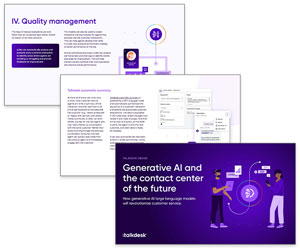You’ve probably heard a lot about emotional intelligence recently and would like to inject a bit of this magic into your customer service teams.
You’ll probably be surprised to hear, however, that it’s always been an integral part of contact centre life.
It’s present in the best-performing agents and people managers. The key difference is that today we’re more tuned into emotional intelligence and its benefits and have given it a ‘label’.
This has enabled managers to better understand what it is, and not only that, to work consciously and proactively to extend its reach across the contact centre – instead of just to a naturally gifted few.
So… What Do We Mean by Emotional Intelligence?
Emotional intelligence is the ability to recognize and understand emotions in yourself and others. It’s also the ability to consciously manage your behaviour and relationships. When you practise high emotional intelligence, therefore, you are more aware of what is happening in your conversations.
Therefore, you are more in control of how you respond to a situation. You can also proactively make better decisions for a more positive outcome. Even when under pressure or dealing with a particularly fraught customer, for example.
Emotional intelligence is the ability to recognize and understand emotions in yourself and others. It’s also the ability to consciously manage your behaviour and relationships.
I’m sure you are already thinking of examples of where you’ve seen these skills demonstrated in your contact centre, aren’t you? But what if everyone behaved in this way? Pause for a moment and think how much better your team performance would be if everyone practised emotional intelligence.
You’d likely see better customer interactions, a stronger sense of team camaraderie, and even more positive manager/agent relationships.
Want to Get Started?
There’s no quick fix to developing emotional intelligence across your customer service teams, but here our readers share their best advice for bringing emotional intelligence into your training plans and contact centre culture.
It Starts With You!
One of the biggest things to get right from the very start of your journey is to make sure you are as emotionally intelligent as you can be. You have to consciously practise what you (intend) to preach! There are no big steps, only lots of small ones…
Here are some suggestions to help you bring emotional intelligence into your day-to-day self:
1. Recognize Your Emotions
It takes some practising, but try to regularly ask yourself “How am I feeling?”. The answer may be happy, sad, grumpy or even “hangry” (anger associated with feeling hungry), but it’s important you tune in to how you feel. Once you begin to recognize how you are feeling, you can begin to build a picture of why you are reacting in a certain way and take steps to better manage it.
Thanks to George
2. Be Kind to Yourself
One of the biggest mistakes you can make is to label emotions as “good” and “bad”.
There’s no such thing in emotional intelligence, as labelling your emotions in this way can distract you from properly managing them.
There are only emotions.
It’s how you choose to manage them that makes the difference.
Thanks to Emma
3. Practise Breathing

A good way to press pause on your day, block out the noise and tune into how you feel is to practise breathing exercises.
A good way to press pause on your day, block out the noise and tune into how you feel is to practise breathing exercises. It can also help you to better manage stress in the short term too.
You can find a lot of breathing exercises online – including on the NHS website – so do a bit of research and find something that suits you. You could even set an alarm on your phone to remind you that it’s time to stop and do your exercises. In time, it will become habit.
Thanks to Grace
4. Take a ‘Mindful Walk’
When was the last time you took a walk without thinking about your to-do list, talking on the phone or checking your messages? If, like a lot of people, you are always multitasking, try a ‘mindful walk’ instead.
By ditching the technology and focusing on the sounds and smells around you, you can clear your mind. Tune in more to the world around you – and how you feel too. It can take some practising, but if you do find your mind wanders, simply return to your focus without judgement.
Thanks to Robert
5. Build Some Silence Into Your Day
Did you know that silence restores the nervous system and conditions the mind to be more adaptive? It’s also associated with the development of new cells in the hippocampus. Try to build 5 minutes silence into your day if you can. Again, set an alarm to remind you to complete your daily period of silence if you need to.
Thanks to Oliver
Our article How to Meditate in the Contact Centre contains useful suggestions on the benefits of meditation in the contact centre.
6. Respond Rather Than React
A key part of maintaining emotional intelligence is ensuring you are not at the mercy of your emotions. Be curious about the emotions that rise within you, try to keep a journal of how you feel and why you think you feel that way. Just little notes here and there can make all the difference.
Then focus on what you can influence. For example, if you notice a pattern that you are always frustrated after a team meeting, step back… Try building in some breathing exercises beforehand to help you relax and experience things more clearly.
This will help you to better respond – rather than just react – to the people around you.
Thanks to Penny
Extend Emotional Intelligence Into Your Customer Service Team
Once you have started to recognize and master emotional intelligence yourself, it’s time to extend these practices into your team. Here, our readers share their best tips and advice for building a business culture that proactively develops emotional intelligence.
7. Encourage Agents to Be Open About Their Emotions
Try to build a culture that encourages and supports people in being open about their emotions. This often starts with sharing and being open yourself.
Try to build a culture that encourages and supports people in being open about their emotions. This often starts with sharing and being open yourself, then asking questions and taking the time to listen (without judgement) if and when individuals open up to you.
Such regular conversations can go a long way in creating a safe space, which allows better understanding and leads to better communication overall.
Thanks to Alex
8. Train Agents to Pause and Reflect Before Responding to a Customer Query
We encourage our agents to pause and walk in the customer’s shoes for a moment before responding.
In training sessions, we always ask them to think about what they would want someone to feel, do or communicate to them if they were making this request.
Thanks to Renee
9. Check in With All of Your Agents at the Start of Each Shift
Make a habit of touching base with every member of the team at the start of each shift. This can help you to gauge their emotions for the day – particularly if they’ve had a stressful morning.
You can then proactively work with them to influence how they then perform and greet your customers, even if this means giving them some time to talk and recharge over a cup of tea.
Thanks to Kerry
10. Build Emotional Intelligence Training Into Your Onboarding Process
When do you start working on emotional intelligence? We’ve always thought the sooner, the better.
We conduct emotional intelligence training during the onboarding period – and have interval follow-ups to check where agents may need additional support.
Thanks to Tina
11. Share Best Practice Across the Team
Our leadership team keep emotional intelligence at the forefront by sharing real-life examples with the team. We even record and play them back, where possible. This helps us ensure we’re sharing best-practice ideas and helping our agents to be the best they can – every day.
Thanks to Amanda
Read our article How to Build an Emotional Connection With Customers to find out what you can do to stay more in tune with customer emotion in the contact centre.
12. Shadow Your Agents to Help Coach Their Emotional Intelligence
Emotional intelligence can be hard for some agents to grasp at first. We’ve found it helps to have team leaders shadowing their agents, and then pointing out where they were (or were not) being emotionally intelligent in their responses. It can also help to do a role reversal, so agents look for good examples of emotional intelligence in their team leaders too.
Thanks to Jashu
13. Talk About Feelings – Not Just Stats – in Your 1-to-1s
Take time in your 1-to-1s to talk about more than just stats and performance.
Make time to discuss how your agents are feeling and ask if there’s anything they might need from you. Remember, this is their chance to check in with you and share what’s on their mind – the good, the bad, and (even) the ugly.
The more you do this, the more they will open up to you and build their emotional intelligence.
Thanks to Alex
14. Tune in to Behavioural Changes Too

Notice behavioural changes too
Emotional intelligence isn’t just about hearing or seeing physical emotions, but also noticing behavioural changes too.
By regularly talking to your agents and making time to truly listen, you’ll grow your emotional intelligence.
This will make it easier to spot when something isn’t quite right.
Thanks to Holly
15. Build Web-Based Courses Into Your Training Programme
We have web-based emotional intelligence training that’s available for all agents and team leaders to complete.
We also have a small library of emotional intelligence books in our contact centre for agents to borrow, read and discuss – including Daniel Goldman: Emotional Intelligence and Primal Leadership (Unleashing the Power of Emotional Intelligence).
Thanks to Thomas
For more great information about emotional intelligence in customer service, read these articles:
- The Emotional Side of Customer Experience
- How to Improve Your Customer Service With Emotional Intelligence
- Emotional Intelligence FAQs Answered by an Expert
- Creating Memorable Customer Experiences With Emotional Intelligence
Author: Robyn Coppell
Published On: 25th May 2022 - Last modified: 23rd Jun 2022
Read more about - Hints and Tips, Customer Service, Editor's Picks, Emotion, Soft Skills, Team Management







































